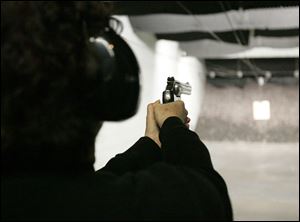
Ohio lets gun owners get licenses elsewhere
Pacts in place with 23 states
7/9/2012
Assistant Lucas County Prosecutor Jeff Lingo, chief of the criminal division
The Blade/Jetta Fraser
Buy This Image

A woman who refused to be identified fires her .22 at the target. She has been shooting about two years and plans to take the concealed carry permit class and wants to get a larger caliber handgun.
Lucas County sheriff's deputies recently responded to a call of a man with a gun.
What they encountered took some sorting out: The jogger was a local man with a gun under his shirt who produced an Ohio driver's license and a concealed-carry permit issued from the state of Florida.
It was a circumstance that took officers off guard. Although recognizing that permit holders have a right to carry a concealed weapon, it was unclear if the Florida license satisfied Ohio law.
State officials and concealed-carry advocates acknowledged that the confusion probably arose from misunderstanding of Ohio's reciprocity policies. But while some say it's just a matter of education, others question why Ohio would allow another state to issue permits to its residents.

Assistant Lucas County Prosecutor Jeff Lingo, chief of the criminal division
"I don't think the people of the state of Ohio understand that other states can dictate who carries a gun in Ohio. By us signing this reciprocity agreement, we're allowing Florida to tell us who in Ohio can carry a gun," said Assistant Lucas County Prosecutor Jeff Lingo, chief of the office's criminal division.
"If you live in the state of Ohio and laws of the state of Ohio govern your conduct, why shouldn't you be required to get an Ohio permit?"
Ohio's reciprocity policy honors valid concealed-carry permits from states with which Ohio has an agreement. Ohio has agreements with 23 other states, according to the Ohio Attorney General's Office.
That means it is legal for someone with a valid permit from one of those states to carry a gun in Ohio. If the Ohio Senate passes House Bill 495 this year, Ohio can enter into agreements with more states.
Jonathan Fulkerson, section chief in health and human services for the Ohio Attorney General's Office, said agreements are in place with those states that have eligibility requirements "substantially similar" to those in Ohio, which include a background check and a specified amount of training. Florida, he said, is one of those states.
But unlike Ohio, Florida will issue permits to nonresidents. And because a reciprocity agreement exists between the two states, Florida licenses can be obtained by Ohio residents and used in Ohio.
"We don't enter into reciprocity agreements with states that don't have some sort of backbone in their licensing. The attorney general wants to make sure that people are adequately trained," Mr. Fulkerson said.
"Some states, because they are more prolific in giving licenses [such as Florida], they are more attractive especially for people who travel a lot," he added. " … We always encourage people to get an Ohio license, but it's not a requirement."
That befuddles some who question why Ohio would allow someone to sidestep state requirements and get a license elsewhere.
Jim Irvine, chairman of the Buckeye Firearms Association, said there are a number of reasons Ohio residents apply for and receive out-of-state licenses. He said his organization strongly recommends that all Ohio residents receive an in-state license but said he understands why some don't.
The main reason gun owners obtain out-of-state licenses is that places such as Florida have reciprocity agreements with more states than Ohio, so a traveler is legal to carry in more states, he said. Other reasons include avoiding the possibility of news media publishing lists of permit holders.
There are some, he acknowledged, that may apply in other states to avoid Ohio's training requirements.
To obtain a permit in Ohio, a person must undergo 12 hours of training and pass a written and practical exam as well as a background check. In a state such as Florida, a license may be given to qualifying people who have passed a background check and an approved firearms or hunters' safety course.
Mr. Irvine said although he is an advocate for training, he believes that it is Ohio's strict training requirements that make permits inaccessible to many because of the time and financial burdens.
Recognizing that concealed-carry permits can be a polarizing issue, Mr. Irvine said the goal of the states should be to create laws that won't hinder law-abiding gun owners.
"You're still going to have the criminals out there," he said. " … People who carry concealed handguns, they stay updated on the law. If they don't and screw up, they go to jail."
A rash of shootings in Toledo has officials considering how to handle gun violence, although both opponents and advocates of concealed-carry permits acknowledge that legal gun owners are rarely the source of the community's gun violence.
In a 24-hour period in mid-June, nine people were shot, two fatally, bringing the total number of shootings to just shy of 100 to date this year.
Toby Hoover of the Coalition Against Gun Violence said that although permit holders start out as law-abiding citizens, "they don't always stay that way." She condemned attempts to update the concealed-carry law, calling the proposed changes a "weakened" version of the requirements.
House Bill 495 would amend Ohio's concealed-carry laws. It was recently approved in a 57-26 vote of the House but has not been considered by the Senate.
In essence, the legislation "authorizes the automatic validity in Ohio of a concealed handgun license issued by another state as long as that jurisdiction recognizes Ohio's license without the need for a reciprocity agreement," according to the office of State Rep. Terry Johnson (R., McDermott), who sponsored the bill.
The bill also changes the definition of "loaded firearm in a vehicle" to mean that a gun is loaded when the magazine is inserted into the gun. Loaded now means the magazine is in the vehicle.
Further, it eliminates the demonstrated competency requirement for a second license renewal. Competency training is not required for a first renewal.
Ms. Hoover said she is concerned about the proposed changes because they open Ohio to "accepting the lowest common denominator" of concealed-carry permits.
"It's a slippery, creeping slope that ends up with fewer and fewer restrictions on those who want to carry concealed guns," she said. " … I just question why that man in [Lucas County] got a permit in Florida. Probably because he wouldn't get one in Ohio."
According to statistics gathered by the Ohio Attorney General's Office for the first quarter of this year, 16,823 concealed-carry licenses and 15 temporary emergency licenses were issued statewide. Also statewide, there were 1,300 renewals, 245 suspensions, 54 revoked licenses, and 263 applicants who were denied licenses.
Since the implementation of Ohio's concealed carry law in 2004, nearly 300,000 permits have been issued statewide.
In Lucas County, 408 regular licenses were issued during the first quarter of 2012. There were also 32 renewals, 12 suspended licenses, 3 revoked licenses, and 18 times when the applicant was denied a license.
Toledo attorney David Borell is a member of Ohioans for Concealed Carry and is familiar with the situation with the jogger. He said the problem that arose was not that the officers were unsure if the license was valid, but that they took the firearm until he proved it was.
"Unless there is some reason to think that the license is not valid, it strikes me as odd to start with the thought that it was not valid," he said. "The problem was, they didn't know the law."
The attorney general's office conducts annual training for law enforcement on a variety of issues, including concealed-carry laws. However, it is usually officers who process applications — and not street officers — who attend the sessions.
Mr. Borell said he hopes this circumstance will be used for training
He added that the state's reciprocity laws should not be looked at in terms of other states telling Ohio how its residents should be trained.
"That's not what it is," he said. " … This is not a situation in which Florida is thumbing its nose at Ohio. Ohio has already said this is OK."
Mr. Borell said ultimately how Ohio handles reciprocity should be left up to the residents of Ohio.
"I think we should leave it up to the states. If Ohio residents want greater reciprocity, then that's what should be done," he said. "Let the state's do what the states want to do. Let federalism work."
Contact Erica Blake at: eblake@theblade.com, or 419-213-2134.